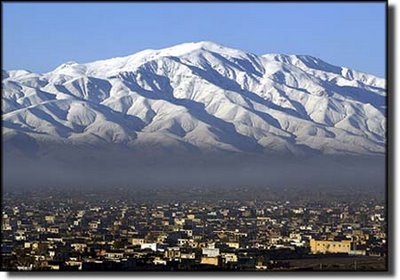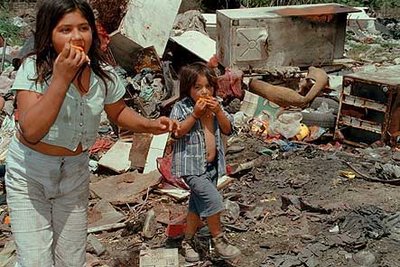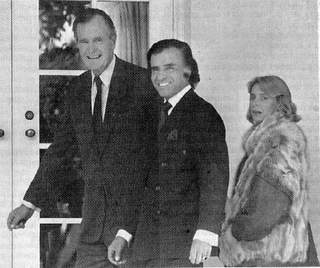
I was just in the mood for someplace new to eat, someplace I hadn't tried before. And I didn't mind driving. My 2007 Zagat for Los Angeles is so worn already that I knew I was unlikely to get any new inspiration there. And then it struck me-- I had seen a story a few months ago in the New York Times about L.A. area Chinese restaurants. I hadn't had Chinese food in 4 years-- ever since my doctor told me they tend to cook the food in extraordinarily cheap and cancer-causing oil and to steer clear. But I was in the mood.
It was easy enough to pull up Mark Bittman's Times story, The East Is West: The Best Chinese Restaurants in Southern California, online. It was all about going out of town, away from the traditional Chinatown and east on the I-10 towards Jacksonville, Florida (just not that far). And not even as far as San Bernardino, although Bittman's point is that the whole 50 mile stretch of the I-10 between L.A. and San Berdoo is "a string of multiethnic communities that all have a large, dynamic Chinese population. There is strong evidence of this in the chains of Chinese supermarkets, the likes of which exist nowhere else in the country. (In these stores, announcements are made first in Mandarin, then in Korean, then Vietnamese; then Spanish, and last English. Really.)"
And one of those towns is Alhambra. Bittman was unequivocal "Follow my advice, drop everything, and rush to eat at Triumphal Palace."
The restaurant follows in the tradition of popular places such as NBC Seafood, Mission 261-- about which, more in a moment-- and the ill-named New Concept. Their menus are large and long-- several pages, at least — and often feature esoteric and very expensive ingredients such as abalone, shark’s fin and bird’s nest.
For my money-- and though it’s upscale by comparison, it doesn’t take much-- Triumphal Palace is the best of the lot, with food that is full-flavored, intricate and subtle, sometimes almost tame. The roast duck, which looks like every other Chinese roast duck you’ve ever had, is so good I suspect it’s not “roast” at all, but fried in clarified butter; it’s that crisp, tender and flavorful. It needs nothing, and certainly not the accompanying marmalade-like substance, which you should not allow to touch the duck. Other dishes are similarly simple, and just about as good: stir-fried Dungeness crab with scallion and ginger; pea greens with mushrooms and the distinctively flavored dried scallops; a pretty dish of chicken slices, huge shiitakes, ham and gai lan (Chinese broccoli), served in layers.
For all of this, Triumphal Palace is perhaps better known for its dim sum (served every day at lunchtime) than for its dinner dishes. Like many of the grand West Coast Chinese restaurants, from Vancouver on south, the dim sum is ordered from a menu-- you’re invariably given a short pencil and a printed sheet, to tick off what you want-- cooked fresh and served hot, rather than being hawked from steam carts. (Still, the problem of everything coming at once can only be solved by staggering your order.)
Six of us-- one of whom now claims she will be married here-- shared 24 dishes (about 18 of which came within 10 minutes), and while all except the predictably sad desserts were good, some were incredible. These were barbecue pork belly, firm cubes of slow-cooked, crunchy-skinned fresh bacon that, I swear, were a dead-on replica of a dish Alain Ducasse used to serve at about five times the price; Chiu Chow-style dumplings, with thick, chewy, slightly crisp rice-flour exteriors filled with (could it be?) jasmine-scented meat; deep-fried carrot cake, in fact a savory-sweet custard-filled dumpling; boiled baby bok choy in fish stock, which, like the duck I’d had at dinner, contained some secret ingredient that was the Bomb; and a wonderful layered creation of pan-fried sticky rice with egg.
On a recent Sunday morning, the place was packed, as usual. The design is faux Deco-slash-modern, not horrible, but with the inevitable stark lighting. Still, the walls are of wood, there are tablecloths, and the chairs are padded and comfortable. At dinner the napkins are cloth, and the plates are changed frequently.
Bittman is clearly insane. But I didn't know that until after I ate in this dive. Although I did know it before I came down with severe MSG poisoning. Before I left for Alhambra I decided to look and see what Zagat reviewers thought. The food rated a very undistinguished "20" (out of 30) and the review touted a "lit-from-behind Lucite bar" and "a spacious aquarium." Well, this New York Times food critic probably is a lot savvier than the John and Jane Does who did the rating for Zagat. Oh, was I wrong.
Let me take Bittman's review apart paragraph by paragraph. The menu was not "large and long;" it was medium-sized. The food was far from "full-flavored, intricate and subtle, sometimes almost tame." It was crap, MSG-flavored garbage and not "sometimes almost tame; always very tame. I took his advice and ordered the closest thing on the menu to what he called "pea greens with mushrooms and the distinctively flavored dried scallops," a soup that claimed those ingredients but which had no trace of scallops-- or flavor. I had asked the waiter if there was MSG in the food before we sat down and he shook his head enthusiastically. I figured he didn't understand. I was wrong.
I also asked him if the soup was enough for me and my friend. He said it was enough for 6 people. He wasn't exaggerating. All the dishes were oversized, which doesn't make up for quality in the slightest. My main course was a shrimp dish that was really bad and my friend had beef chow fun which he said tasted the same as beef chow fun does in any Hollywood dive.
Alain Ducasse should sue Bittman for comparing his creations to this swill. When I was around 16 I hitchhiked across the U.S. and a merchant seaman picked me up in a Cadillac and drove from Ohio to California. He claimed he had eaten in the best Chinese restaurants in Peking, Canton and Shanghai and that he would tale me to one that was better than any of them right down the road in Amarillo. I hadn't been to China yet but I had eaten enough Chinese food in Brooklyn to know that good Chinese food was not going to be served in a restaurant with baskets of rolls and rye bread on the tables. The restaurant was in a roadside mini-mall off Route 66, but it wasn't that much worse than the one off Route 10 in Alhambra. As for Bittman's other suggestions, if the Triumphal Palace is his "New Favorite Restaurant," I'll steer clear of #2, thru 5.
By the way, the next day I had the first headache I've had in many years and I was dizzy for two days. I didn't dare drive my car; something I never experienced in my entire life. I felt like I was going to fall over several times. My neighbor told me L.A. Chinese restaurants stopped using MSG years ago. I don't doubt it. Alhambra is like 30 minutes away though.














